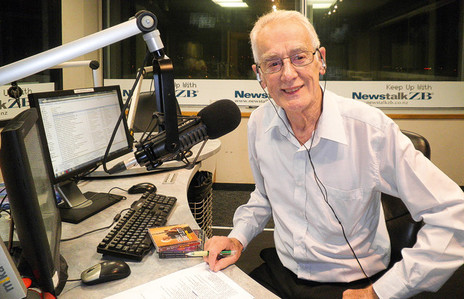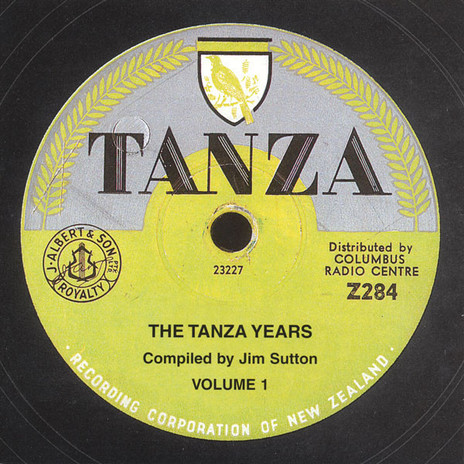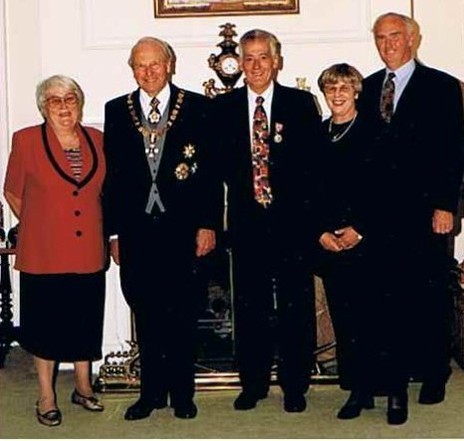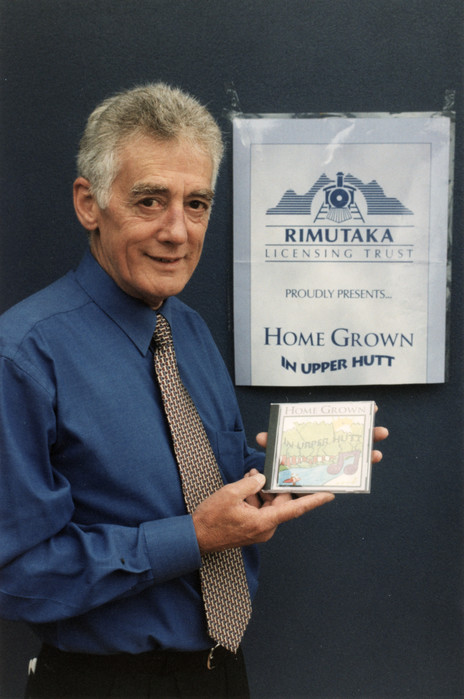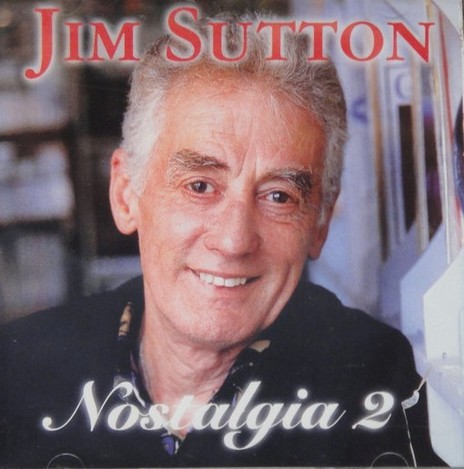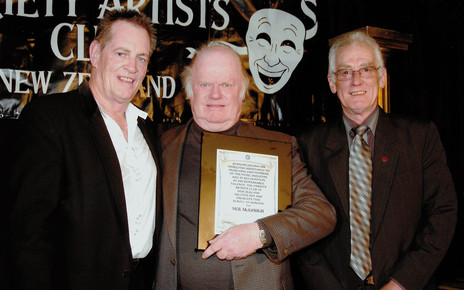The radio career almost didn’t happen. In the late 1980s, after a short period behind the scenes as a producer at Radio Pacific, he had an audition at Radio New Zealand to see if he was suitable to become a host at Newstalk ZB. “I got the letter back saying I’d never be a commercial broadcaster,” Sutton told me in 2013.
Unsaid are the words, “… and the rest is history.” For his programme Nostalgia with Jim Sutton did make history. Not just for lasting nearly 25 years on ZB – whose Auckland managers ignored head office – but for the New Zealand social and musical history that his listeners discussed each week. Sutton’s talkback show wasn’t about airing gripes, but a town square to share memories.
All Sutton had to do, he says, was suggest a topic that touched upon growing up, and the listeners would almost take over. “Department stores, rural life, holidays, pubs, trains, boats, planes, trams – people love trams, throughout New Zealand – the great stories would roll on and on.”
Plus there was music, with songs chosen to generate more memories, in particular New Zealand songs. Again, almost by accident, stories of New Zealand music and entertainers became a central part of the programme. Week after week for over two decades, he would welcome a New Zealand musician from an era when playing a supper waltz was required, and the listeners responded with reminiscences of their own.
These chats with veteran musicians from the 1940s, ’50s and ’60s became a substantial oral history of New Zealand entertainment. Many of Sutton’s guests were once drawcards in New Zealand dance halls, and have now passed away. Among them were Daphne Walker, Gerry Merito, Nancy Harrie, Simon Mehana (of Lou and Simon), Garner Wayne, Toni Williams, Peter Posa, Frank Gibson Sr, John Rowles, Phil Warren – and many others.
Sutton’s chats with veteran musicians became a substantial oral history of New Zealand night life.
Sadly, the interview that launched the series is missing. The legendary Tongan steel-guitar players Bill Wolfgramm and Bill Sevesi came to the studio together. Wolfgramm – best known for recording ‘Haere Mai’ with Daphne Walker – was very shy and nervous, but having his friend and rival Sevesi present meant it was a magic night. The next week featured a reunion of the Stardusters, the male trio which sang backing vocals on ‘Opo the Crazy Dolphin’ in 1956. “Of course, there was no show without Punch – Pat McMinn. She drove up all the way from Tauranga, and that really started the ball rolling.”
The New Zealand musicians who had hung up their rock’n’roll shoes – or jazz, country and Hawaiian pop – became crucial to the show’s success. Their interviews became a valve-radio conversation between artists and musicians, with some of the calls offering intimate memories. (One night, a distant relative of the guest called in. “Have you had a sherry?” she asks, whereas earlier it had been explained that the retired musician had had a stroke.)
Sutton grew up in Point Chevalier, in Auckland's inner west. He came of age in the mid-1950s when rock’n’roll arrived. “Which was great: old-time dances weren’t part of my scene. I’ve never learnt to dance. Rock’n’roll was my era. I listened to all that music – all the music I played from the 1940s on, even the 30s, as a kid it was on the radio and I heard it and enjoyed it. I always enjoyed all styles of music. My grandmother took me to see Mina Foley’s farewell concert, in Auckland, also Patrick O’Hagan, the Irish tenor. She also took me to the movies, The Great Caruso. Her tastes were very catholic, all kinds of music.”
After high school, as an apprentice plumber, Sutton played rugby for Suburbs. “A group of us knocked around together. On Saturday nights, it was down to the Avondale College dance, there was a pretty good rock’n’roll band there – the place used to pulse with people. We would meet up with the girls. We often went to the Point Chev Sailing Club, to see Des Taylor and his band the Hulawai’ians. Now that was a band.”
Tom Sharplin, veteran rock’n’roll revivalist and president of the Variety Artists’ Club, says Sutton’s “fantastic passion” for early New Zealand pop music was enjoyed by thousands, and a valuable service. “It was obvious that he had done his homework with these recordings, many of which we would never have enjoyed again. On the odd occasions when there was a Saturday night that I wasn’t performing, listening to Jim’s show was like a history lesson.”
It is largely thanks to Sutton that New Zealand’s first independent record label, Tanza, has had much of its catalogue reissued. In the early 1990s, when he visited Vida Peach, the widow of Tanza engineer Noel Peach, at her rest home, she liked his style – and his clean shoes. She took him to her garage, which was full of Tanza master tapes and 78s in pristine condition. “She said, ‘If you’d like to help yourself, you’re more than welcome.’”
Sutton took the “treasure trove” of Tanza tapes home in his car boot.
Sutton took the “treasure trove” home in his car boot, and found an expected surprise: tapes of many commercials and jingles recorded for 1ZB in the 1950s. They became a very popular part of annual programmes that celebrated an earlier era of radio. “We’d have a night of commercials, and people would call up, singing them. You’d get four hours out of that. Then we’d play a night of serials and soap operas – Portia Faces Life, Dr Paul, Life with Dexter, Night Beat – and a night talking about renowned radio hosts such as Phil Shone and Merv Smith.
On 13 April 2013, Sutton became another to join that roster of lost radio hosts, when ZB changed its format and the Saturday night Nostalgia show was replaced. The replacement show was also designed to encourage memories but with more recent music: no songs before 1970 would be on the playlist. Fans of Sutton – and at times he has attracted over 200,000 listeners – would have to stimulate their own memories of the show with his latest compilation CD.
Nostalgia: the Very Best of the Jim Sutton Show (Sony) featured perennial hits by Artie Shaw, Rosemary Clooney, and many other overseas stars placed alongside favourites by New Zealanders such as Eddie Low, Suzanne Prentice, and Peter Posa.
For a while, after his ZB sojourn ended, net-savvy nostalgists could dial up Sutton online, where his music show broadcast 24 hours a day on his own streaming website.
On his final show on ZB, Sutton told his listeners that the first song he had aired in the show in 1988 was Merle Haggard’s ‘Are the Good Times Really Over?’ The last guest, guitarist Gray Bartlett, stayed on to “help me make it through the night”.
It was, said Sutton – and his listeners surely agreed – “an emotional ride”. A few years later he reflected, “Twenty-five years in radio, I had a good run, and every one of those Saturday nights was fantastic."
Sutton and his wife Anne left Auckland to be near family in Wanaka, where he died in April 2020, in his 80th year. Besides having a top rating show for many years, other accolades he received were his induction into the Gold Guitar Awards Hands of Fame, a Scroll of Honour from the Variety Artists Club, and the Queen's Service Medal in 2000.
--
An expanded version of a profile first published in the NZ Listener of 26 October 2013, with the headline, “Nostalgia ain't what it used to be.”
